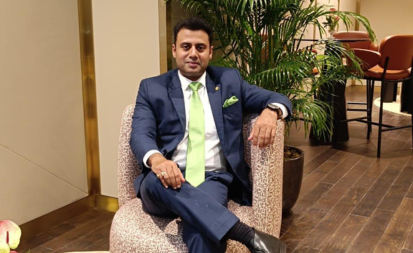Transforming Hospitality: The Intersection of Technology and the Guest Experience
Authored article by Kahraman Yigit, Co-Founder and CEO – Olive by Embassy The hospitality industry, long defined by its personal touch and human interactions, is undergoing an evolution. Integrating advanced technology into guest experiences has redefined

Authored article by Kahraman Yigit, Co-Founder and CEO – Olive by Embassy
The hospitality industry, long defined by its personal touch and human interactions, is undergoing an evolution. Integrating advanced technology into guest experiences has redefined how hotels, resorts, and other accommodations operate, providing unprecedented levels of convenience, personalisation, and efficiency. This not only meets the expectations of modern, tech-savvy travellers but also enhances operational capabilities, setting new benchmarks for guest satisfaction.
Harnessing Data for Personalisation
At the core of this technological revolution is data analytics. Contemporary hospitality businesses utilise big data to understand and anticipate guest preferences and behaviours. By examining booking histories, social media interactions, and feedback, hotels can customise their services for individual guests. For example, a frequent guest who prefers room service might receive personalised menu suggestions, while another who favours higher floors can have their room pre-assigned accordingly. This level of personalisation creates a sense of familiarity and loyalty, transforming a simple stay into a bespoke experience.
Remote Management and Real-Time Insights
Leveraging remote management technology is a game-changer in hospitality. This innovative approach provides real-time insights into operations, enhancing efficiency and facilitating tailor-made guest experiences. By anticipating needs and preferences before they arise, hoteliers can deliver unparalleled service with precision. For instance, the use of facial recognition and other AI capabilities can streamline check-ins and improve security, while remote monitoring ensures that any issues are promptly addressed.
Artificial Intelligence and Operational Productivity
Artificial intelligence (AI) significantly boosts operational productivity in the hospitality sector. AI-driven systems, such as virtual receptionists and business intelligence tools, automate routine tasks and optimise resource allocation. For instance, AI can manage customer inquiries, booking requests, and troubleshooting around the clock, allowing human staff to focus on more complex and personalised interactions. By integrating AI into business intelligence, responsibilities traditionally handled by mid-level management can be efficiently transferred to AI systems, resulting in higher situational awareness and better resource management.
Smart Rooms and IoT Integration
Smart room technology is revolutionising the industry. Internet of Things (IoT) devices enable guests to control room settings such as lighting, temperature, and entertainment through their smartphones or voice commands. Imagine entering a hotel room where the environment adjusts to your preferences instantly—lights dimmed, temperature set to your liking, and your favourite music playing. This seamless integration not only heightens comfort but also meets the modern traveller’s demand for convenience and control.
Mobile Technology and Contactless Services
In an increasingly mobile-reliant world, the hospitality industry is embracing mobile apps and contactless services. Guests can now book, check in, access their rooms, and communicate with hotel staff all through their smartphones. This technology streamlines the guest experience and addresses health and safety concerns, particularly relevant in the post-pandemic era. The ability to manage these aspects of their stay independently enhances guest satisfaction and operational efficiency.
Advanced Video Analytics for Safety and Efficiency
Collaborations with AI implementation experts have led to the deployment of advanced video analytics tools in hospitality. These tools optimise resources, making living spaces smarter, safer, and more secure. For example, a cutting-edge video analytics system can monitor and analyse real-time footage to improve security and operational efficiency. This technology ensures the safety of guests and their belongings, as well as helps maintain a high standard of service by identifying and addressing issues promptly.
Sustainability Through Smart Technology
Technology also drives sustainability in hospitality. Smart energy management systems reduce energy consumption by adjusting heating, cooling, and lighting based on occupancy. Additionally, digital platforms minimise the need for printed materials, contributing to environmental conservation. Hotels adopting water-saving technologies and waste management systems reflect a commitment to sustainability that appeals to environmentally conscious travellers. This fusion of technology and sustainability not only lowers operational costs but also strengthens the property’s appeal to eco-aware guests.
Enhanced Guest Feedback and Service Improvement
The integration of AI in gathering and analysing customer feedback has significantly improved service quality. AI-enabled tools can transcribe and examine customer conversations, identifying common pain points and areas for improvement. By diving into these insights, hospitality providers can continuously refine their services, ensuring a higher level of guest satisfaction.
As the industry continues to evolve, embracing these technological advancements will be key to meeting the dynamic needs of modern travellers and setting new standards for excellence in hospitality. The future of hospitality lies in this harmonious blend of technology and human touch, creating experiences that are not only efficient and convenient but also memorable and personalised.
—-
 English
English French
French German
German Italian
Italian



